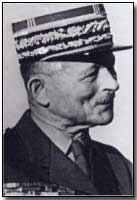Who's Who - Maxime Weygand
 Maxime
Weygand (1867-1965) served as
Ferdinand Foch's deputy
for the entirety of the First World War.
Maxime
Weygand (1867-1965) served as
Ferdinand Foch's deputy
for the entirety of the First World War.
Having graduated from St. Cyr in 1885 and subsequently earned repute as a cavalry instructor at Saumur, Weygand began the First World War as a Lieutenant-Colonel of Hussars in the French Fourth Army.
Later the same month, August 1914, French Commander-in-Chief Joseph Joffre assigned Weygand as Chief of Staff to Foch in the new Ninth Army. From thereon Weygand worked exclusively with Foch until the war's close.
Promoted Major-General in 1916 Weygand served on the Supreme War Council from December 1917, replacing Foch. The following April, with Foch's appointment as Supreme Allied Commander, he served as French Army Chief of Staff.
Weygand subsequently worked closely with Foch during the armistice negotiations in November 1918. It was Weygand who read the armistice conditions to the German delegation in a railway carriage at Compiegne.
Weygand's post-war career was, in light of his association with Foch, a successful one. He was appointed Chief of the General Staff in 1930, serving until the following year, and was also Vice-President of the Supreme War Council. From 1931-35 he was Inspector-General of the army, after which he retired.
In August 1939, aged 72 and with the Second World War looming, he was brought back from retirement and appointed commander of eastern Mediterranean operations at Beirut. In May the following year he replaced Maurice Gamelin as French Supreme Commander.
Although expected to outline plans to defeat the Germans in his new capacity he instead recommended capitulation on 13 June 1940. For the next three months he was Minister of Defence in the newly-established Vichy government, until he was sent to North Africa as Algerian Governor General and Delegate General in French North Africa.
However the Germans, somewhat suspicious of his activities, recommended to the Vichy government his recall in November 1941, after which he was returned to retirement.
Recalled once again by Petain he was asked for advice in the wake of the Allied invasion of North Africa in November 1942. Weygand's counsel was simple if alarming: to return to war against Germany. Four days later, on 12 November, he was arrested and imprisoned by the Germans.
With the Allies' victory and de Gaulle's entry into post-war government Weygand was briefly arrested and imprisoned for having served in the Vichy government. Following his release he was officially cleared of Vichy collaboration in 1948.
Around one million Indian troops served in WW1, of which some 100,000 were either killed or wounded.
- Did you know?
